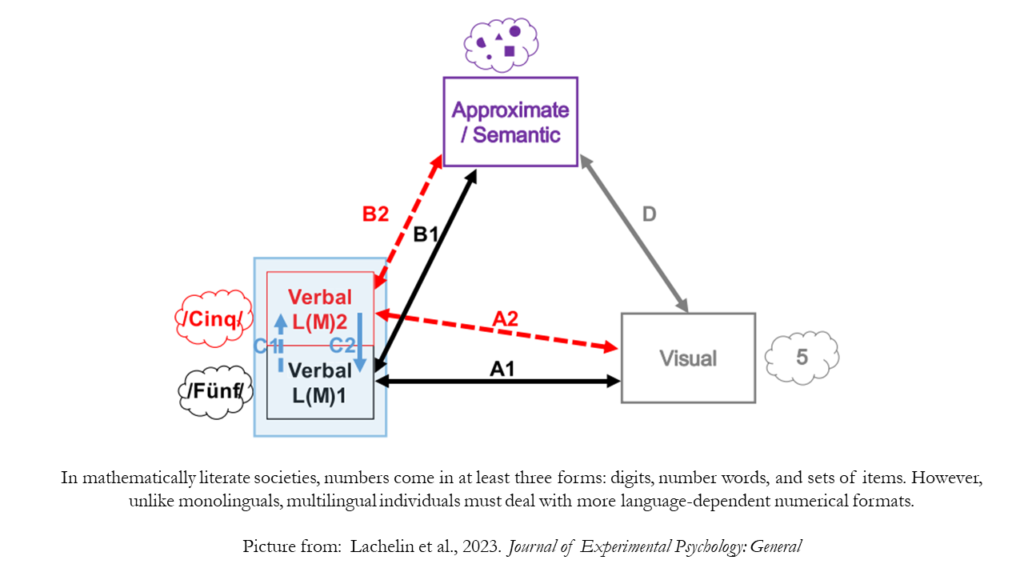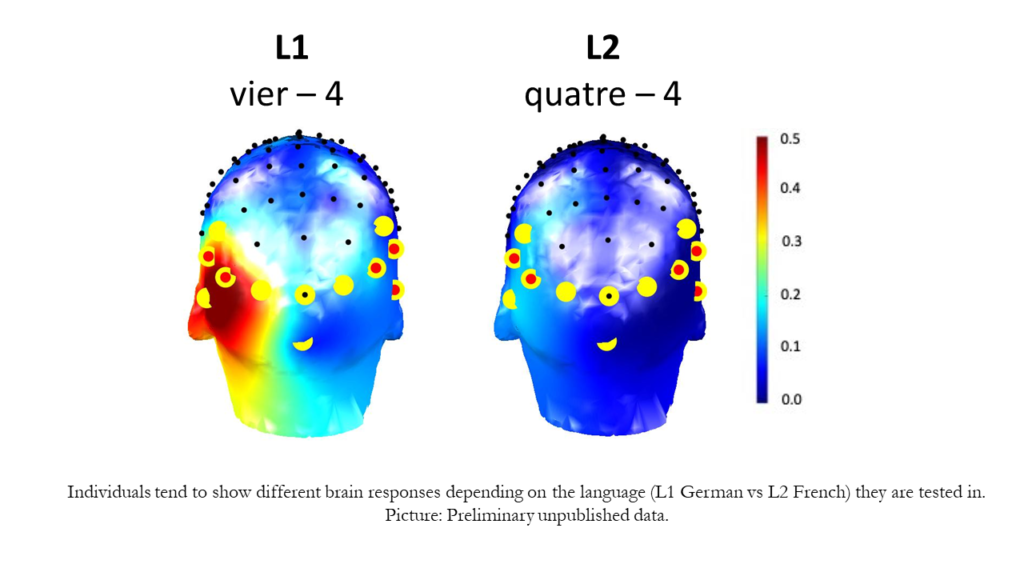BACK TO RESEARCH WITH IMPACT: FNR HIGHLIGHTS
In an increasingly multicultural and multilingual society – especially in Luxembourg – it is key to ensure an educational system that leaves nobody behind due to language barriers. With this in mind, researchers in Luxembourg are studying different aspects of how multiple languages affects a child’s ability to learn numbers.

“We experience super-diversity here in Luxembourg: we have adults and children from different nationalities, socioeconomic statuses, and languages. In such diverse societies, multilingualism is both a blessing and a curse,” Mila Marinova, psychological scientist working as a Postdoc at the University of Luxembourg explains.
“On the one hand, people achieve high proficiency in several languages. Still, data shows that this poses serious educational challenges, especially if the language of educational instruction and the individual’s mother tongue do not coincide.”
This means that people are at risk of struggling academically – not because of their cognitive abilities, but because of language barriers.

Language struggles negatively impact mathematics performance
A growing number of studies have looked into the connection between multilingualism and academic performance, especially in mathematics: Individuals for whom the language of the educational instruction is not their first language are often at a disadvantage and their mathematical performance tends to be impacted negatively compared to individuals for whom the language of instruction is the same as their first language.
“This lag in performance tends to increase with school years. Finally, because of their lower performance, L2 speakers may also experience more learning and evaluation-related anxieties, hindering their learning further. ”Dr Mila Marinova Psychological scientist working as a Postdoc at the University of Luxembourg
Studying multilingual populations poses challenges
It is a challenge to study multilingual populations in controlled experimental settings, because they are so diverse. Therefore, conclusions and recommendations should be drawn only carefully. Additionally, studying the effects of multilingualism on academic and mathematic performance is still relatively new, meaning that researchers are often dealing with many unknowns.

“One big challenge at the methodological level is that multilingualism is a spectrum and includes many variables, such as proficiency and when the language was learned – early in childhood of later in development. All these characteristics must be factored in. From an applied perspective, ironically, many people, including math teachers, believe that math content is somehow language-free. However, numbers and mathematics are inherently linguistic systems and the evidence is clear that they influence each other on many levels. Yet, math and language skills are still largely seen as independent knowledge domains. ”Dr Mila Marinova Psychological scientist working as a Postdoc at the University of Luxembourg

Finding: Whether you do math in your first or second language significantly matters at all cognitive levels
Mila Marinova’s research focuses on the fundamental cognitive principles of learning numbers in a multilingual environment. She is looking into how speaking multiple languages affects children’s abilities to learn the logic of counting, understand that each number has a successor, and understand that numbers can go to infinity.
“Further, we are searching to understand how learning these early numerical competencies depends on the transparency of the concrete language structure.
“For instance, certain counting lists are transparent – such as the French ‘vingt et un’ = twenty plus one, others are not or less, such as the German ‘einundzwanzig’ = one and twenty. Finally, we are also trying to understand how the language and learning environment at home contribute to these early stages of number development.”
Language status essential when a child learns to count
Mila explains they have made an important finding: Through behavioural studies, such as interactive tasks with kindergarteners, as well as neurocognitive studies, such as measuring brain responses, they have seen that the language status of the child (L2 or native speaker) is an essential factor when a child learns to count. This is important because counting has a gatekeeping role for learning more advanced numerical competencies.

“We have also seen that in adult individuals, the language in which they process number words- the first language of math instruction vs the second language of math instruction – triggers different brain activity patterns. So, overall, whether you do math in your first or second language significantly matters at all cognitive levels. ”Dr Mila Marinova Psychological scientist working as a Postdoc at the University of Luxembourg
Dr Mila Marinova is psychological scientist working as a Postoc on an FNR CORE project in the Cognitive Neuroscience Group of Christine Schilz at the University of Luxembourg.
MORE ABOUT MILA MARINOVA
Describing her research in one sentence
“To paraphrase a respected researcher in our field (Barbara Sarnecka), I would say: “Numbers bear the fingerprints of our language experiences: the more languages we use for numbers and mathematics, the more complicated the architecture is, the more critical it is to understand it, and the stronger the foundations should be.” “
What drives her as a scientist
“I was passionately curious about what makes people tick from a very early age. I carry this passion to this day, and I am constantly searching for unanswered questions—the more challenging they are, the better. So, being a psychology researcher in cognitive neuroscience feels natural to me. I chose the University of Luxembourg, particularly the Cognitive Neuroscience Group because our culture here brings the best out of you professionally while also caring about you personally.”
What she loves about science
“My love of science runs deep. It is intellectually challenging and a constant source of inspiration, motivation, and curiosity for me. It is also a rewarding experience because you discover and create things that remain long after you. You get to add your piece to the puzzle of human knowledge and are constantly in the company of very smart and stimulating people. Not every occupation enjoys these luxuries.”
Where she sees herself in 5 years
“I see myself continuously working as a researcher and scientist, preferably at a higher education institution. I am also very passionate about science communication, so I would like to continue doing this. I think there are various ways to continue being a scientist and scientific communicator, both within and outside of academia, so I am keeping an open mind.”
Mentors with an impact
“Starting with the obvious, my postdoctoral supervisor, Prof Christine Schiltz, and my doctoral supervisors, Prof Bert Reynvoet and Dr Delphine Sasanguie (KU Leuven, Belgium), have been inspiring and highly supportive supervisors who gave me much creative freedom and autonomy. They really helped me grow. It was somewhat unconventional, but my mom was my first mentor. As a retired university lecturer, she instantiated a love of knowledge and learning in me since I was very little.”
Related: 25 examples of research with impact featuring Christine Schiltz
Related highlights
Spotlight on Young Researchers: Advancing ecosystem monitoring with remote sensing and innovative models
The health of terrestrial ecosystems is intricately linked to the sustainability and stability of society: forests, grasslands, and cropland, play…
Read more
Spotlight on Young Researchers: Unravelling the role of calcium signalling to overcome melanoma drug resistance
Cutaneous melanoma is the most serious type of skin cancer and the sixth most frequent cancer in Europe. Despite progress…
Read more
Spotlight on Young Researchers: Advancing sustainable land use
Industry, agriculture and waste disposal all cause soil pollution, a threat to both ecosystems and human health. Environmental scientists and…
Read more
Spotlight on Young Researchers: Toward greener AI
Deep learning has seen an explosive growth and as it is now being relied upon in areas such as healthcare,…
Read more
Spotlight on Young Researchers: Combining machine learning & life events data to predict depression
A high number of people experience experiences depression in older age. Factors such as childhood conditions, adult life trajectories, and…
Read more
Spotlight on Young Researchers: Probiotics to the rescue
Billions of living microorganisms live in the human gut microbiome. Research has shown that an imbalanced microbiome plays a role…
Read more